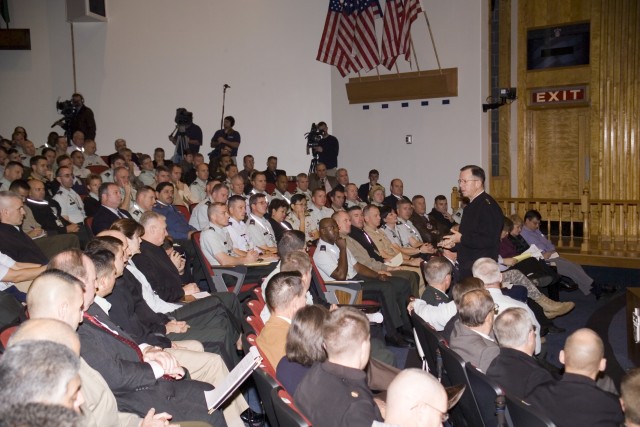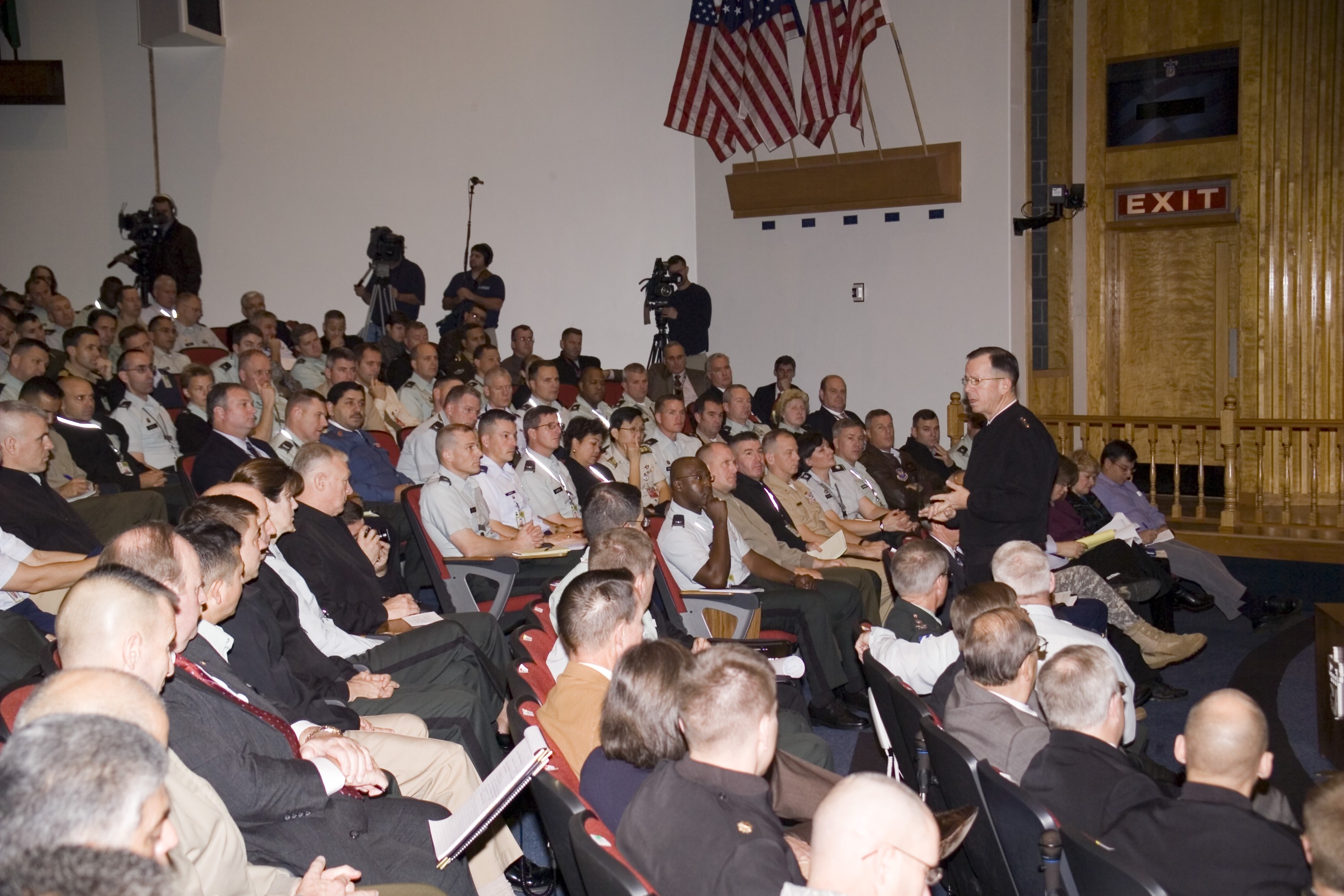Adm. Mike Mullen, Chairman of the Joint Chiefs of Staff, spoke to U.S. Army War College students and faculty in Bliss Hall on Nov. 28, about the persistent nature of changing conflict.
"In my time in the military, this is the most vital and unprecedented and possibly dangerous time to serve," he said. "I commend you for all that you do."
During the hour-long talk, Mullen talked about the current status of operations and what the future may hold.
""We live in a time of tremendous change. Almost every dimension of what we do is changing," said Mullen. "That's why it's important to focus at the strategic level. Our people and mission sets are changing. Everyone is asked to do more."
He also challenged the students to look beyond today's conflicts.
"The United States will continue to be globally engaged," he said. "Keep focused on Iraq and Afghanistan but also what could be in the future."
Mullen focused multiple times on how people are an integral piece of the present and the future of the military.
"People are the most precious resource we have," he said. "We need to make sure that we get the right people to the right place. Taking care of them is what's important."
Mullen stressed that taking care of wounded servicemembers was also important.
"I want to do everything I can to take care of those wounded in battle and so should you," he said. "It's our duty to make sure they are okay."
The students were reminded that it's not only military actions that stress the nation.
"We now operate in a global environment where we also help respond to possible pandemics, humanitarian assistance and other types of emergencies," he said. Mullen stressed that education about these types of events was vital to their development as leaders.
Mullen recognized the contributions of the international students who attend the college.
"I appreciate all of you coming to study here, many of you far away from home," he said. "We can't do it all alone, that's why coalitions are so important. These relationships will bear fruit in the future."
One of the students in the audience, Col. Laura Loftus of Seminar 5 said she enjoyed Mullen's talk.
"I thought his whole speech was incredibly interesting, especially regarding democratization and the role the U.S. plays," said Loftus. "His whole approach to people and families was very clearly stated that as military members and family we need to find ways to support and retain our own Soldiers."
Mullen said that he felt strongly about the leaders who were gathered in Bliss Hall.
"Leadership is one of the most important things in our lives and leading in these challenging times is a privilege," he said. "You represent that important leader and that challenge lies on your shoulders."
Adm. Mullen Background
Admiral Mullen was sworn in as the 17th Chairman of the Joint Chiefs of Staff on October 1, 2007. He serves as the principal military advisor to the President, the Secretary of Defense, the National Security Council, and the Homeland Security Council.
A native of Los Angeles, he graduated from the U.S. Naval Academy in 1968.
He commanded three ships: the gasoline tanker USS Noxubee (AOG 56), the guided missile destroyer USS Goldsborough (DDG 20), and the guided missile cruiser USS Yorktown (CG 48).
As a Flag Officer, Admiral Mullen commanded Cruiser-Destroyer Group 2, the George Washington Battle Group, and the U.S. 2nd Fleet/NATO Striking Fleet Atlantic.
Ashore he has served in leadership positions at the Naval Academy, in the Navy's Bureau of Personnel, in the Office of the Secretary of Defense and on the Navy Staff. He was the 32nd Vice Chief of Naval Operations from August 2003 to October 2004.
His last operational assignment was as Commander, NATO Joint Force Command Naples/Commander, U.S. Naval Forces Europe.
Admiral Mullen is a graduate of the Advanced Management Program at the Harvard Business School and earned a Master of Science degree in Operations Research from the Naval Postgraduate School.
Prior to becoming Chairman, Admiral Mullen served as the 28th Chief of Naval Operations.
U.S. Army War College background
The mission addresses Senior Level College education for lieutenant colonels and colonels. There are three concurrent classes: the 10-month resident education program and the first and second-year phases of a two-year Distance Education Program. Graduates of both programs currently receive Joint Professional Military Education Phase I certification, earn the Army's Military Education Level 1 identifier or equivalent, a Master of Strategic Studies degree, and the U.S. Army War College Diploma.
The War College education centers on the development and employment of land power and addresses Strategic Thinking; Theory of War and Strategy; Strategic Leadership, National Security Policy and Strategy; Joint Processes and Land Power Development; and Implementing National Military Strategy. Students also take electives, which must include one of six Regional Studies. The intent is to focus students on how to think versus what to think. Students are encouraged to explore and debate a variety of positions through critical thinking to develop a range of viable options vice a single solution.
The resident class is comprised primarily of U.S. military officers, but also includes civilians from various government agencies and 41 international students from allied nations. Each resident class typically has 340 students. The current resident class student body is comprised of 60 percent U.S. Army officers, with the remaining 40 percent of students coming from other military services, government agencies, and international allies.
Each resident class is divided into 20 seminar groups that include members from all U.S. service branches, government agency civilians and international students. Students bring unique perspectives into their seminar discussions, allowing classmates to view the strategic landscape from multiple points of view.


Social Sharing